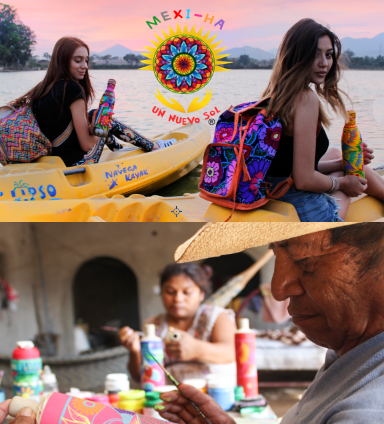
Hand painted bottles created by Oliverio García and Joaquina Santos at the community Nahuatl of Guerrero.
Photo Credit: Mexi-HA taken by Janette Casas.
Summary
In different native communities in Mexico exists a strong potential of artistic work that could become commerce and benefit the economy.
The poverty in Mexico is focused in native communities. 45.5 percent live in moderate poverty and 26.6 percent live in extreme poverty. Some causes of this are the lack of opportunities represented by the unemployment rate and the exclusion to, and the low levels of, educational attainment.
Mexi-HA is a social company, responsible for generating inclusion in the first nation communities, through the commercialization of products decorated with popular art and service at events (from volunteer to festivals).
Mexi-HA is more than a word, “Mexi” means México and “HA” is a word traduced to the languages Wixarika and Maya, meaning water. It is a company that contributes to employment opportunities for native communities often facing a status of isolation. Since its creation in 2015, the company has had participation from 13 members from the native Nahuatl community, nine Choles members employed in the state of Chiapas, three Zapotecas in the state of Oaxaca, three Wixaricas in the state of Jalisco, and two companies of potters in the suburb of Tonala.
The mission of the company is to promote the sharing of Mexican art services and products that have a utilitarian focus in daily life, while persevering the work and culture of artisans and communities.
It is very important for all of the Mexi-HA team to preserve Mexican culture because over the years original traditions in Mexico have been lost. Each member of the company works to make an important mark related to their roots while they decorate some product that has daily use in life.
Additionally, with the use of its bestselling product, the insulated tumbler painted by Nahuatls, they are reducing the 13 million tons of plastic, of which half is caused by disposable products, that are damaging our planet.
History
We are overjoyed at being one of the lead countries with the greatest number of indigenous people. It’s the same honor that began Mexi-HA’s story in Guadalajara, Mexico. The founder of Mexi-HA was walking along one of the Guadalajara’s streets on a warm day with good company and along our way we found a talented painter who we realized was making art from the Nahuatl culture.
As I looked at my water bottle I thought “this could look incredible painted with his artwork,” we discussed it with the artist named Oliverio and he told us how we could pay for it. In that moment the idea of decorating a product with daily use with artwork was born.
This meeting led us to a visit of his indigenous community. Oliverio told us his story and his family’s stories, all who shared the same talent as Oliverio and were without a job. This became our project, creating an artisan team of different families of the community. We thought that the idea would be very welcome because Mexi-HA could start a fair trade with the many families, the products would be hand painted and items of daily use, hand sewn and hand carved one hundred percent by hand, reusables, that would support the preservation of culture from the first native nations and improve the quality of life for many.
We also thought it would be convenient to work with more communities and cultures, sharing new product lines for consumers who like decoration, clothing, accessories, bottles, native clothes, and customized products providing a mutual benefit for the makers.
The Company
This innovative opportunity let the beneficiaries of the native communities find a job according to their skills, while supporting their traditions and fervor.
We have the support of a programmer who works on the website, we also have support of FedEx that allows us to ship products to our customers, and the artists that are part of the Mexi-HA initiative provide volunteer support for our administration, finances, social media, and marketing of our events.
Mexi-HA received an investment from Janette Casas and advertising support on major television networks thanks to the Mexican government as INADEM and the Secretaría de Economía, ITESO, GSBI Boost, as well as the Universidad Jesuita de Santa Clara provided a professional mentor and sponsorships by COMEX, Estrella Roja - Agustín Argentin S.A. de C.V., and Food Founding. Mexi-HA is also collaborating with many different companies where Mexi-HA and the partners create an exclusive product, some of these companies include: Diamonds of Swarovski, Cava de Oro, and Sagrante.
Is very important for Mexi-HA’s team to keep Mexican culture alive, because over time the first traditions of Mexico were disappearing. Day by day, each craftsman of the company works by decorating everyday items with popular art to keep alive the folk and culture of our country.
Our principal product is the insulated tumbler for drinking water, hand painted by native painters of the Nahuatl culture, with the purpose of reducing plastic pollution caused by single use, disposable plastics. We made the decision to choose products friendly to, and sustainable for, nature.
- The insulated tumbler (imported product) keeps drinks cold for 24 hours and drinks hot for 12 hours.
- The ceramic bottle is crystallized on the inside (local product from Tonala, Jalisco) and made by potters and painted by the native Nahuatls.
- The plastic bottle is food grade safe and is reusable and not considered disposable plastic.
Mentioning our principal product, we have additional product lines where customer have the option to customize products according to their needs including: interior decorations, accessories, clothing, and native cloths.
We decided to create more product lines to generate more items as they employ different native communities localized in different provinces of the country.
The Logo
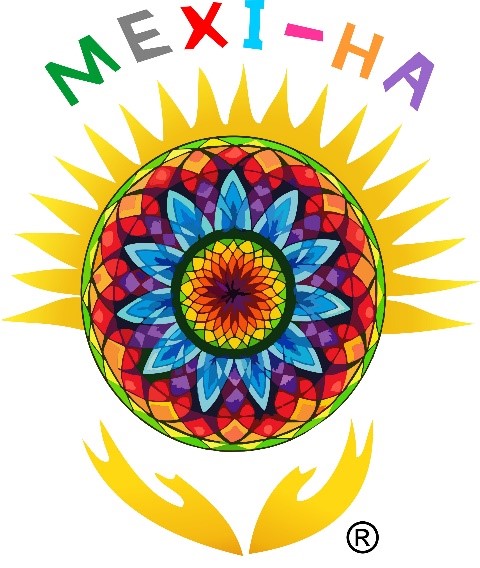
The imagery of our logo that represents our organization is inspired with the following meanings: the sun represents positive actions that our company makes, the mandala represents Mexican folklore, and the hands represent teamwork.
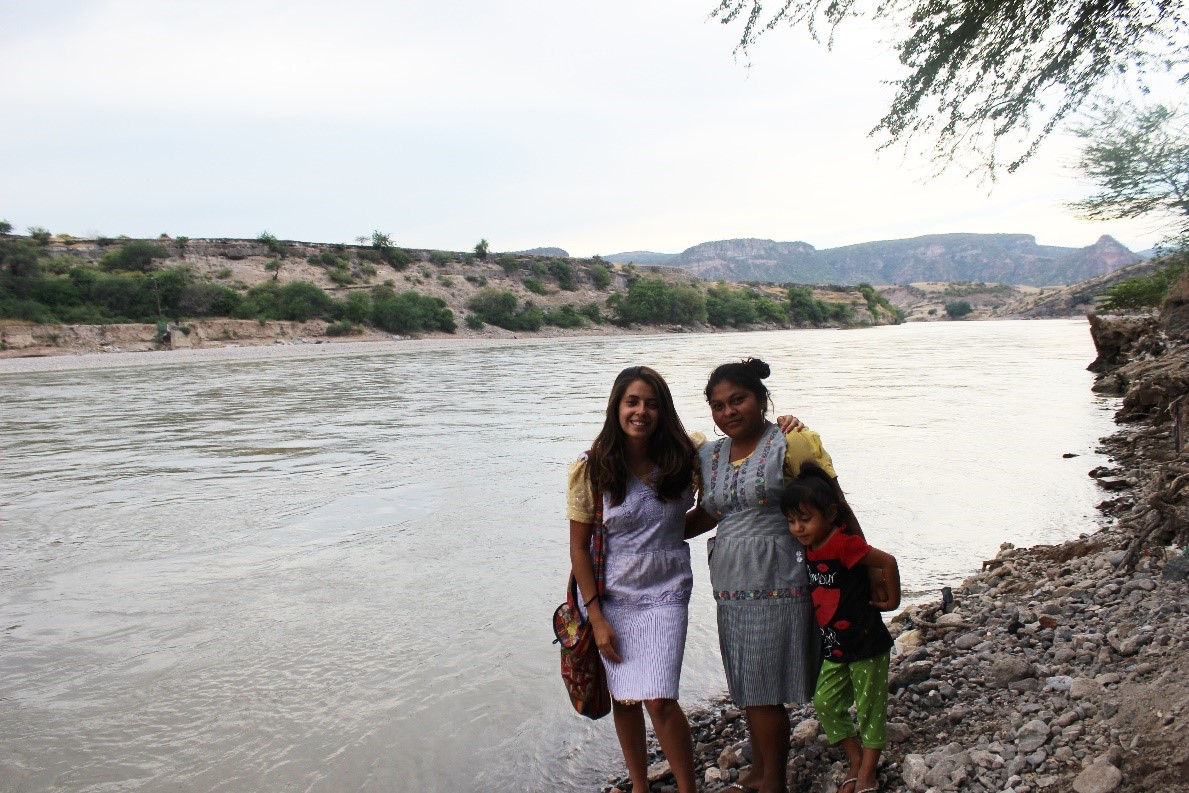
Joaquina Santos and Janette Casas in Guerrero, invited families with Nahuatl roots to work painting products with tradition and popular art.
Credit: Mexi-HA and Janette Casas.
Values
Social & Environmental Responsibility, Justice, Teamwork, Creativity, Happiness, Perseverance, Passion & Sensibility.
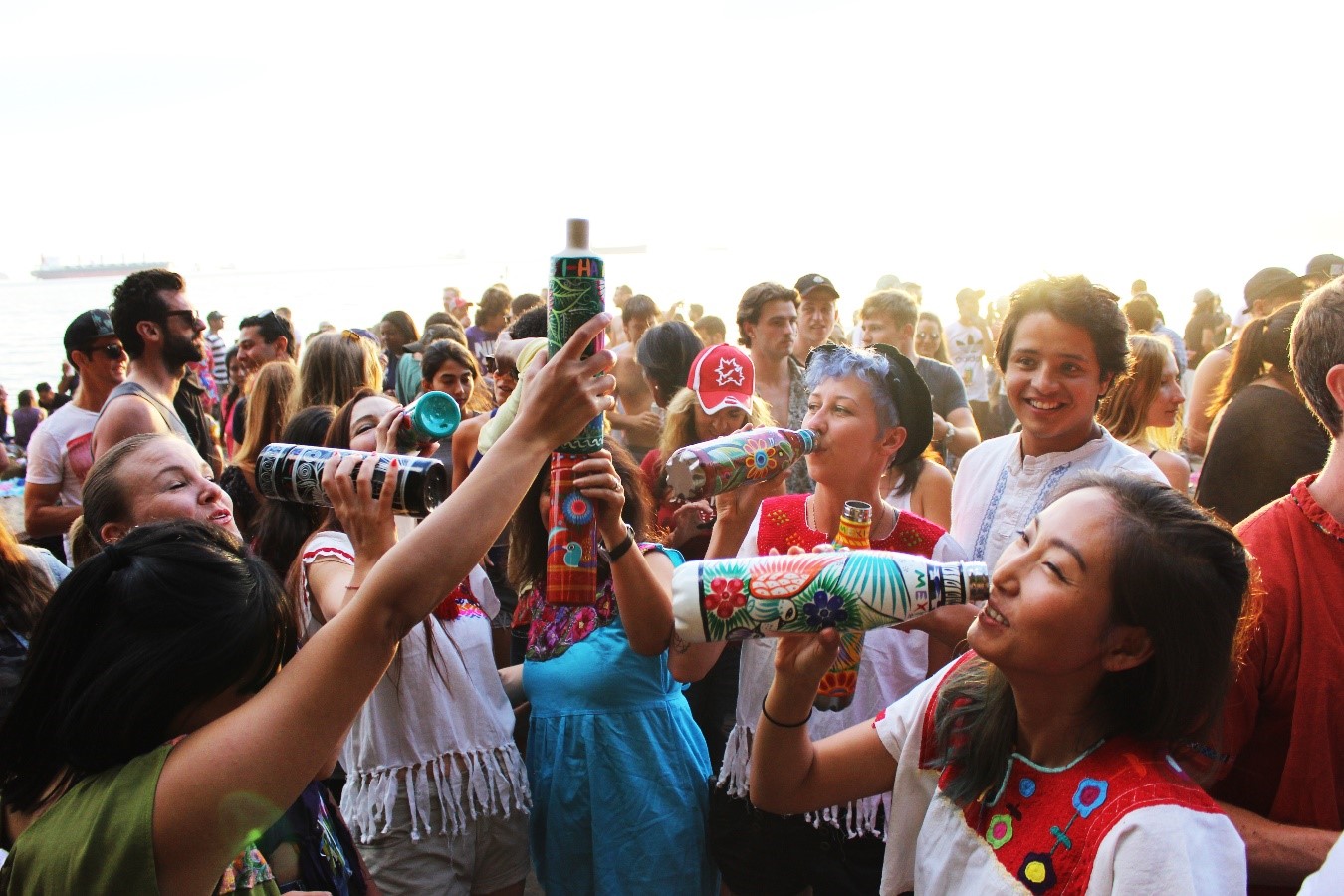
Party with products and members of Mexi-HA in Third Beach, Canada.
Credit: Mexi-Ha, photo taken by Jeanette Casas.
Obstacles
Mexi-HA faced a lot of obstacles as its projects increased. We will mention the most important to explain the value of how we get overcame some of them.
- Obtaining sufficient economic resources to generate opportunities to improve the quality of life for families from different states of the country has not been easy. Additionally, when foreign customers buy products online, they think that their shipping price is very expensive.
- The communication that Mexi-HA has with artisans is sometimes difficult due to the limited communication technology that they have in their communities, the difficulty of moving because of long distances, and the poor telephone and internet signal. It has been a great achievement to obtain sufficient capital to get electronic devices that sometimes allow us to get in touch, nevertheless we are considering collaboration with a professional company that provides broadband service in different communities.
- The lack of technology that would enable us to avoid the loss of painted products that if dropped would not damage the decorations painted on the product.
- We need additional financing to open our first store to make it possible for consumers to look and buy products personally that would help us to increase our sales, enable customers to admire in-person the work of the artist, and create product stock through adequate storage. This investment will allow artisans to earn 50.8 percent more than what they usually receive as a payment on the street.
Social Service and Environment
In addition to providing jobs and lifting up the value of indigenous cultures, we are one step further in the inclusion and revaluation of indigenous people by creating spaces for cultural exchange. To do this, we have created volunteer events to work together to improve our environment by collecting garbage, painting deteriorated walls, and planting trees among other activities.
Volunteers of all ages, mestizos and native people participate, working together to improve specific problems in their community. We look for ideas where art and teamwork are a support for present difficulties.
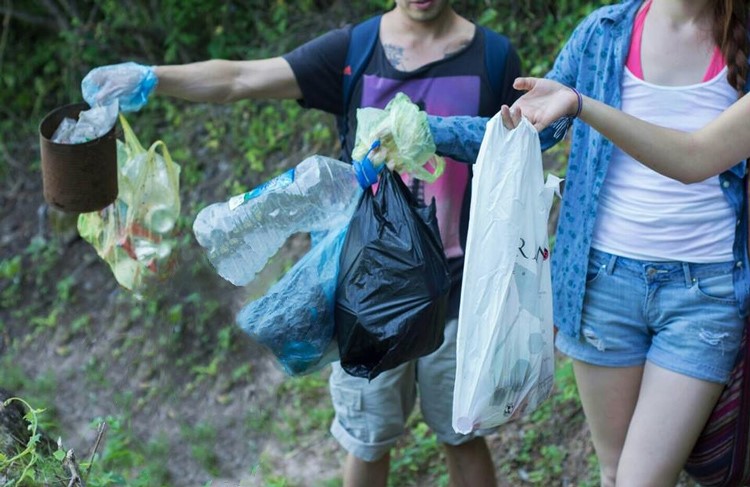
Garbage collection day with Mexi-HA volunteers at the Barranca de Huentitan, Jal.
Credit: Mexi-HA, photo taken by Diem.
The Festival
We also organize a festival that keeps alive the roots of our culture. It is through this festival that we unite to the maximize the cultural and artistic areas of our country. During the event a stage is shared by artists of music, dance, visual arts, crafts, outdoor cinema, and photography exhibition, while there is the live sale of crafts, food trucks, entertainers, artists creating their works, photographers, and many more surprises.
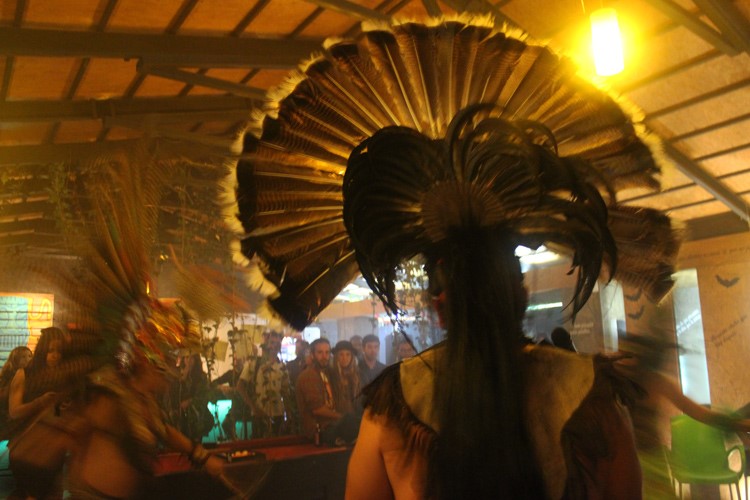
Cultural festival commemorating the Day of the Dead, participants of the Mexi-HA community in Zapopan, Jal.
Credit: Mexi-HA, taken by Janette Casas
We give space to all people with artistic talents who wish to promote their work. Mexi-HA invites citizens and foreigners to participate and the public to enjoy this event. We achieve an unforgettable moment that makes everyone feel what Mexico has to offer through its different cultures.
Impact
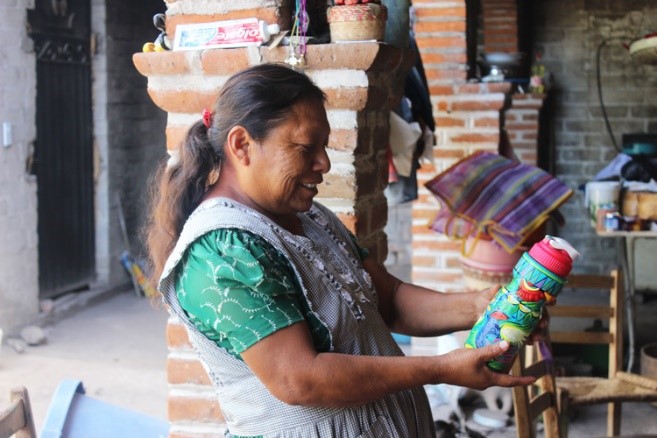
Cecilia, artisan with Nahuatl origin, she feels satisficed of collaborate with Mexi-HA in Guerrero, Mexico.
Credit: Mexi-HA, taken by Casas
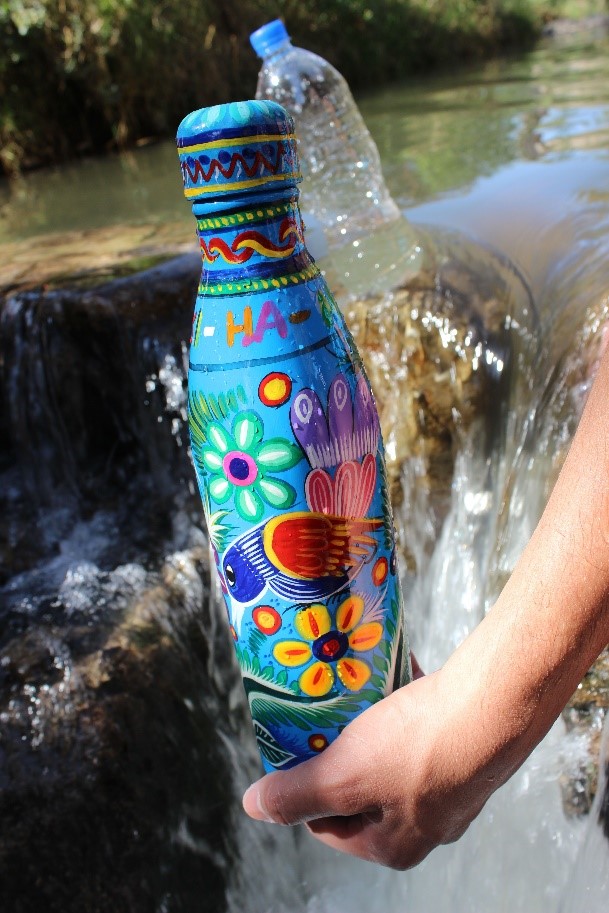
Mex-HA water bottle at the Bosque de la Primavera, in Jalisco.
Credit: Mexi-HA
- 93 percent of native craftsman feel that their work is more valued.
- The artisan obtains an average increase of 58 percent of profits for each piece produced with respect to the sale price of the same item on the street.
- Products are exported with social responsibility to Austria, Canada, and the United States.
- At present due to Mex-HA products more than 500 plastic bottles have been removed from the sea that threaten to kill the marine life.
Lessons Learned
We have achieved profits through Mexi-Ha to support greater inclusion of different native communities, and with it, the preservation of the Mexican culture and its positive impacts on the economy of the country.
We have learned to relate to, and to know, different options for the growth of the company, such as accelerators, investors, institutions, and funding that supports the entrepreneur with financing and mentoring.
Mexi-HA has formed a partnership with FedEx to work together and thanks to is we are creating more shipping options that are more affordable for customers. Mobile devices have been distributed to some artisans and through text messages, we communicate when they can find a place without a signal. We have learned to communicate in a common language to understand the needs of each of the craftsman and team members of the company in a spirit of teamwork, focused on the good of organization, agreed upon payment dates, scheduled events, achieving agreements that benefit everyone, all of which has finally created good relationships and a family environment among all of us despite our differences of origin. We have generated graphics to teach craftsman in training important concepts in the development of popular art. To date, we have successfully generated online sales and we work to be part of different stores where the Mexi-HA product can be purchased nationally and internationally.
Visions for the Future
After completing the survival stage, we are in a second stage where an investment was already obtained to generate jobs in indigenous communities and in the city, to get raw material, and a network of customers has been created while research is being carried out to achieve more points of sale, objectives, and leverage. We are in a stage of growth and we are studying future strategies that allow further maturity in the company such as stable customers.
Our dream is to have a gallery where the customer can touch and buy the products of Mexi-HA in a personal way, located in a tourist place in Mexico. We want the products to be located in at least five stores of other companies in 10 of the biggest tourist attractions in Mexico and to increase our engagement in our virtual store by 90 percent. Finally, we plan to participate in an accelerator that will allow us to receive donations to have enough capital to enable us to have suitable stock and obtain certification as a B Corp.
It is a reality that the strengthening of Mexi-Ha has created a precedent by offering our native communities an opportunity to empower themselves and improve their living conditions without losing their identity and while preserving their traditions through art.
Author bio
Janette Casas is an entrepreneur and Mexican businesswoman. She founded Mexi-HA and is the CEO, of the social company, responsible for generating inclusion in communities of first roots, commercialization of products with popular art as decoration, and through the service of events (volunteer and festivals). Janette’s school career took place in Guadalajara, Jalisco, Mexico. At age 15, she moved to the United States and studied for two years at Eagle Rock High School. Currently, she is 21 years old and studying Communication and Audiovisual Arts at the Technological Institute of Higher Studies in Tlaquepaque, Jalisco, Mexico. Janette lives outside Mexico during the summer, and for three years has lived in Canada where she works as a dance instructor and to sell Mexi-HA products at fairs like Cloverdale Rodeo. She considers herself an active person and loves to serve others in a creative way.


